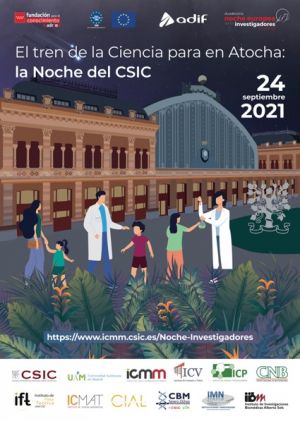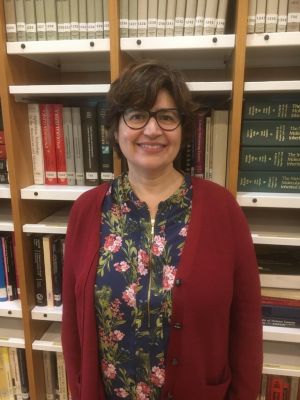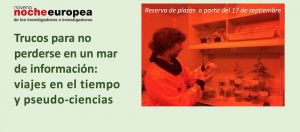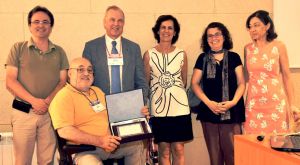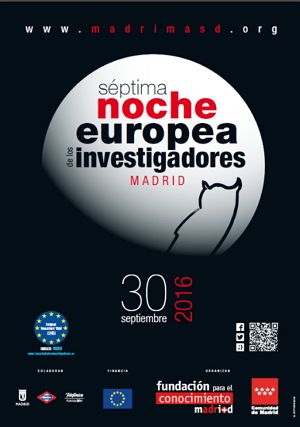El próximo 24 de septiembre los centros del CSIC del Campus de Cantoblanco cogemos el tren hasta la estación Madrid Puerta de Atocha uniendo la Noche Europea de los Investigadores e Investigadoras al Año Europeo del Ferrocarril. De la mano de personal investigador y con la colaboración adicional del CRF-INIA y el IMA, los diez centros del campus realizaremos talleres y demostraciones científicas sobre microbios, plantas, alimentos, materiales, superconductividad, química, matemáticas y también una yincana sobre grandes científicas. Durante la mañana, las actividades se dirigen a centros educativos y por la tarde, a público general.
La nueva edición de la Noche Europea de los Investigadores e Investigadoras, se celebrará los próximos días 24 y 25 de septiembre, coordinada por la Fundación para el Conocimiento Madri+d en la Comunidad de Madrid. Por tercer año consecutivo, los centros del CSIC del Campus de Cantoblanco se unen para celebrar una actividad conjunta, en esta ocasión llamada “El Tren de la Ciencia para en Atocha: la noche del CSIC” que tendrá lugar el 24 de septiembre en el jardín tropical de la Estación Madrid Puerta de Atocha y en la que, a modo de feria científica, se ofrecerán diversos talleres y demostraciones científicas.
Las personas que decidan pasarse por este gran evento podrán acercarse a la investigación en ciencia de materiales, tecnologías químicas, biotecnología, matemáticas y ciencia de los alimentos que se realiza en estos centros. Además, se organizará un escape road en el que se presentarán perfiles de científicas galardonadas con el premio Nobel.
El día estará dividido en dos turnos, uno por la mañana dirigido a centros educativos, y otro a partir de las cinco de la tarde abierto al publico general.
El proyecto “Severo Ochoa y el código genético: descifrando mensajes encriptados” ha sido uno de los 28 proyectos seleccionados por la Fundación General del CSIC (FGCSIC) en la tercera edición del Programa Cuenta la Ciencia
El proyecto, basado en los experimentos que llevaron al descubrimiento del código genético, busca acercar la ciencia a los jóvenes a través de la “resolución de un misterio” poniendo como ejemplo el trabajo del profesor Severo Ochoa, en el 60 aniversario de la concesión del premio Nobel. La actividad, destinada a estudiantes de 4 de ESO se realizará en Institutos de Enseñanza Secundaria (IES) de varias localidades de ámbito rural, y en barrios menos favorecidos de ciudades grandes para favorecer el acceso de jóvenes de este entorno a la ciencia.
Rosario Fernández, organizadora de la actividad recalca cómo “los experimentos que llevaron al desciframiento del código genético son un claro ejemplo de lo apasionante que puede ser la ciencia. La idea es dar a conocer estos experimentos a los alumnos y a la vez lanzar el mensaje de que la ciencia es divertida, interesante y que está al alcance de todos”.
El material producido con la financiación del Programa Cuenta la Ciencia quedará a disposición del equipo de Recursos Educativos del CSIC y de los distintos IES en los que se realice la actividad.
30/4/2020. Ya está disponible el vídeo divulgativo: Severo Ochoa y el código genético: descifrando mensajes encriptados"
Trucos para no perderse en un mar de información: viajes en el tiempo y pseudociencias.
En este evento discutiremos la necesidad de ejercer el espíritu crítico ante la inmensa cantidad de información (y desinformación) que nos rodea. Lo haremos a través de dos ejemplos: examinando paradojas, consistencia y ciencia en las películas de viajes en el tiempo y cuestionando las afirmaciones que hacen distintas pseudociencias (y por tanto su validez).
MÁS INFORMACIÓN Y RESERVA DE PLAZAS AQUÍ
At the “Microbiology and Society: Challenges” meeting of the Teaching and Dissemination Group of the Spanish Society of Microbiology (SEM), the president of the society, Prof. Antonio Ventosa, expressed the recognition of SEM to Professor Miguel Vicente for his work to disseminate Microbiology. In this event, which took place on July 19 in Madrid, a plaque acknowledging his activity since the 1980s to bring science closer to society was presented to Prof. Vicente.
Para celebrar la Semana del Cerebro 2018 el CNB organiza el taller Neurochef: ¡Saboreando!
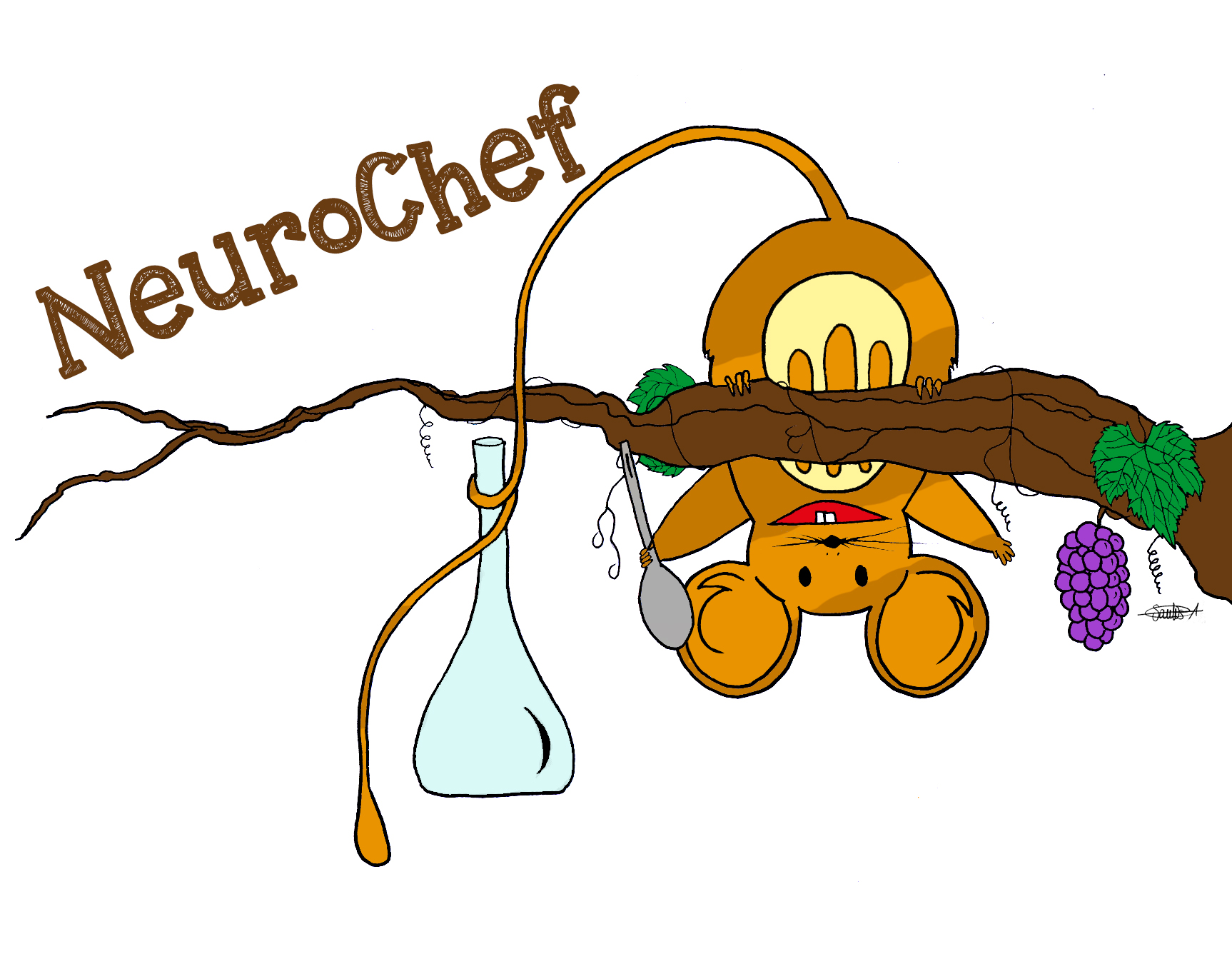
El objetivo principal de esta actividad es que los niños, a través de la exploración y con la ayuda de expertos, descubran los cinco sabores fundamentales (dulce, salado, ácido, amargo y umami) y comprendan cómo se produce la sensación del gusto. Se explicará cómo, desde las moléculas especializadas de la lengua (receptores del gusto), la señal sube por los nervios sensoriales hasta el cerebro. La actividad brindará la oportunidad de explicar, de manera simple, cómo el cerebro está organizado en diferentes áreas anatómicas y cuáles son aquellas especializadas en la percepción del gusto. Para ello contaremos con la colaboración de un científico y chef profesional (Jorge Cuéllar) y una investigadora en Neurociencia (Mª Rosario Fernández Fernández).
Inscríbete aquí.
Datos de la actividad:
Actividad dirigida a niños de 6 a 8 años (los padres deberán permanecer cerca de las instalaciones del museo y recoger a los niños al finalizar la actividad)
Fecha - 16 de marzo
Horario - de 17.00h a 18:15h.
Lugar - Museo Nacional de Ciencias Naturales
Se requiere inscripción previa
Actividad gratuita hasta completar aforo.
IMPORTANTE: La actividad incluye la cata de alimentos. Los padres de los niños con intolerancias o alergias alimentarias deberán informar debidamente a los organizadores.
Esta actividad se realiza en colaboración con el Museo Nacional de Ciencias Naturales, se enmarca dentro de la Semana del Cerebro (Brain Awareness Week) y ha sido financiada por la Sociedad Española de Neurociencia (SENC).

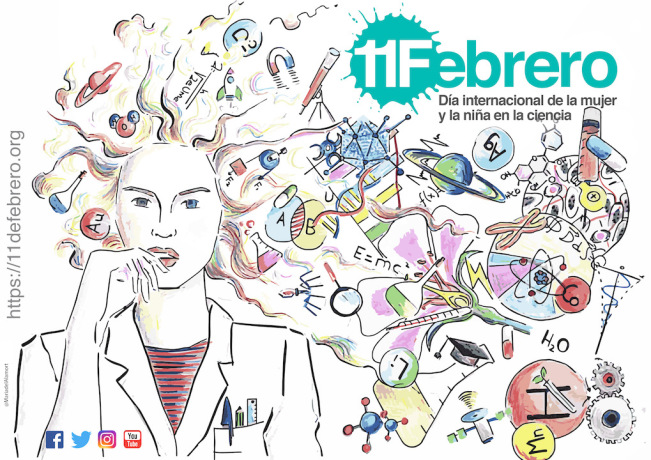
El día 11 de febrero ha sido proclamado Día Internacional de la Mujer y la Niña en la Ciencia por la Asamblea General de las Naciones Unidas. En el CNB-CSIC, por segundo año consecutivo, en 2018 nos unimos a la Iniciativa 11 de Febrero, coordinada por investigadoras y comunicadoras de diferentes instituciones españolas, con varias charlas y talleres que se celebrarán a lo largo del mes de febrero y que pretenden visibilizar y poner en valor el papel de las mujeres en la ciencia tanto en la actualidad como en el pasado.
Taller Adivina tu Científica Aventurera
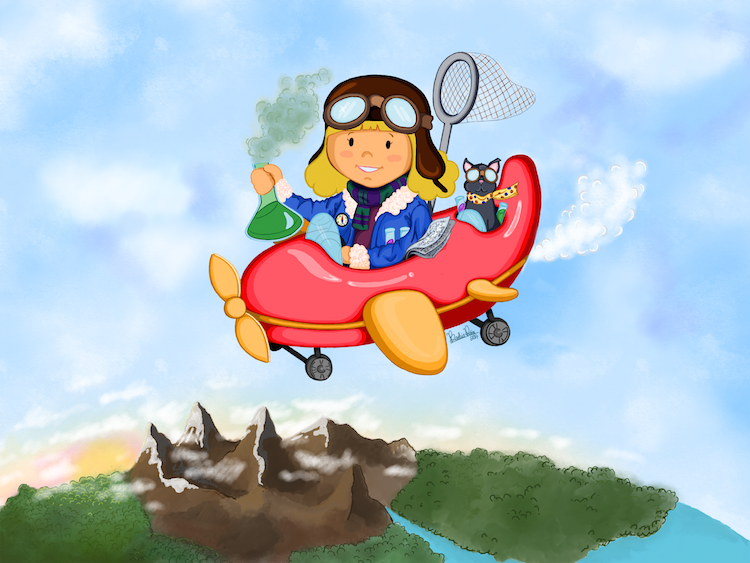 Científicas y científicos del campus CSIC-UAM en Madrid nos unimos para acercar a los peques a científicas ilustres. Mediante actividades y juegos aprenderán sus descubrimientos y aventuras. Realizaremos 28 talleres dirigidos a alumnos y alumnas de 4º,5º y 6º de primaria. 16 de estos talleres se realizarán en el centro cultural la Casa Encendida (Ronda de Valencia, 2 Madrid) los días 1, 2, 6,7, 8, 9, 13 y 14 en horario de mañana. Los otros doce talleres se han concertado con dos CEIP Silvio Abad y CEIP Menéndez Pelayo. Cada taller está pensado para una clase completa y estará dirigido por dos científicas o un científico y una científica. En cada uno de los talleres los niños conocerán a seis de las siguientes científicas aunque se trabajará especialmente sobre cuatro de ellas: Inge Lehman, Hedy Lamarr, Tu Youyou, Emmy Noether, Marie-Anne Pierret Paulze, Marie, Curie, Valentina Tereshkova, Jane Godall, María Blasco, María Mitchell. Organiza conjuntamente: ICMM-CSIC, CNB-CSIC, ICP-CSIC, IFIMAC
Científicas y científicos del campus CSIC-UAM en Madrid nos unimos para acercar a los peques a científicas ilustres. Mediante actividades y juegos aprenderán sus descubrimientos y aventuras. Realizaremos 28 talleres dirigidos a alumnos y alumnas de 4º,5º y 6º de primaria. 16 de estos talleres se realizarán en el centro cultural la Casa Encendida (Ronda de Valencia, 2 Madrid) los días 1, 2, 6,7, 8, 9, 13 y 14 en horario de mañana. Los otros doce talleres se han concertado con dos CEIP Silvio Abad y CEIP Menéndez Pelayo. Cada taller está pensado para una clase completa y estará dirigido por dos científicas o un científico y una científica. En cada uno de los talleres los niños conocerán a seis de las siguientes científicas aunque se trabajará especialmente sobre cuatro de ellas: Inge Lehman, Hedy Lamarr, Tu Youyou, Emmy Noether, Marie-Anne Pierret Paulze, Marie, Curie, Valentina Tereshkova, Jane Godall, María Blasco, María Mitchell. Organiza conjuntamente: ICMM-CSIC, CNB-CSIC, ICP-CSIC, IFIMAC
Del CNB-CSIC participaron impartiendo los talleres: Teresa Bueno, Alejandro Martín, Julene Madariaga, Cristina Nieto, Alejandro Navarro, Ángeles Hueso, Alberto Fernández, Marta Cobo, Mª Carmen Mena, Carolina Carrasco, Micaela Andrea Navarro, Mari Paz González, Cristina Navarro, Elvira Marín, David Maulenda, Julia García (coordinación).
Otras charlas y talleres en centros educativos
Desenrollando el ADN, por Clara Aicart. 3º ESO
Adivina tu científica aventurera, por Aranzazu Cruz. 5º primaria.
La mujer en la ciencia, por Cristina Martínez
Más de 600 invitados de todas las edades han participado presencialmente en las celebraciones del vigesimoquinto cumpleaños del Centro Nacional de Biotecnología del CSIC. A ellos se suman más de 6000 visitantes virtuales que, a través del nuevo blog de divulgación, el boletín de noticias y diez nuevos audiovisuales, han participado este año de la ciencia y las celebraciones del centro. Todas las actividades quedan enmarcadas por una exposición que recoge la historia del CNB-CSIC en los últimos 25 años.
El día 11 de febrero ha sido proclamado Día Internacional de la Mujer y la Niña en la Ciencia por la Asamblea General de las Naciones Unidas. En el CNB-CSIC este año 2017 nos unimos a la Iniciativa 11 de Febrero coordinada por investigadoras y comunicadoras de diferentes instituciones españolas con una actividad que se celebrará el lunes 13 de febrero y que pretende servir de punto de encuentro entre las científicas de nuestro centro y escolares de entre 11 y 12 años.
En una actividad que combinará la ciencia, la educación y el periodismo, los alumnos tendrán la oportunidad de convertirse en reporteros por un día y hacer una entrevista a cuatro investigadoras que contestarán todas sus preguntas. La actividad cuenta con el apoyo del programa "España vuelta y vuelta" de RNE que enviará un corresponsal a cubrir las entrevistas de los alumnos.
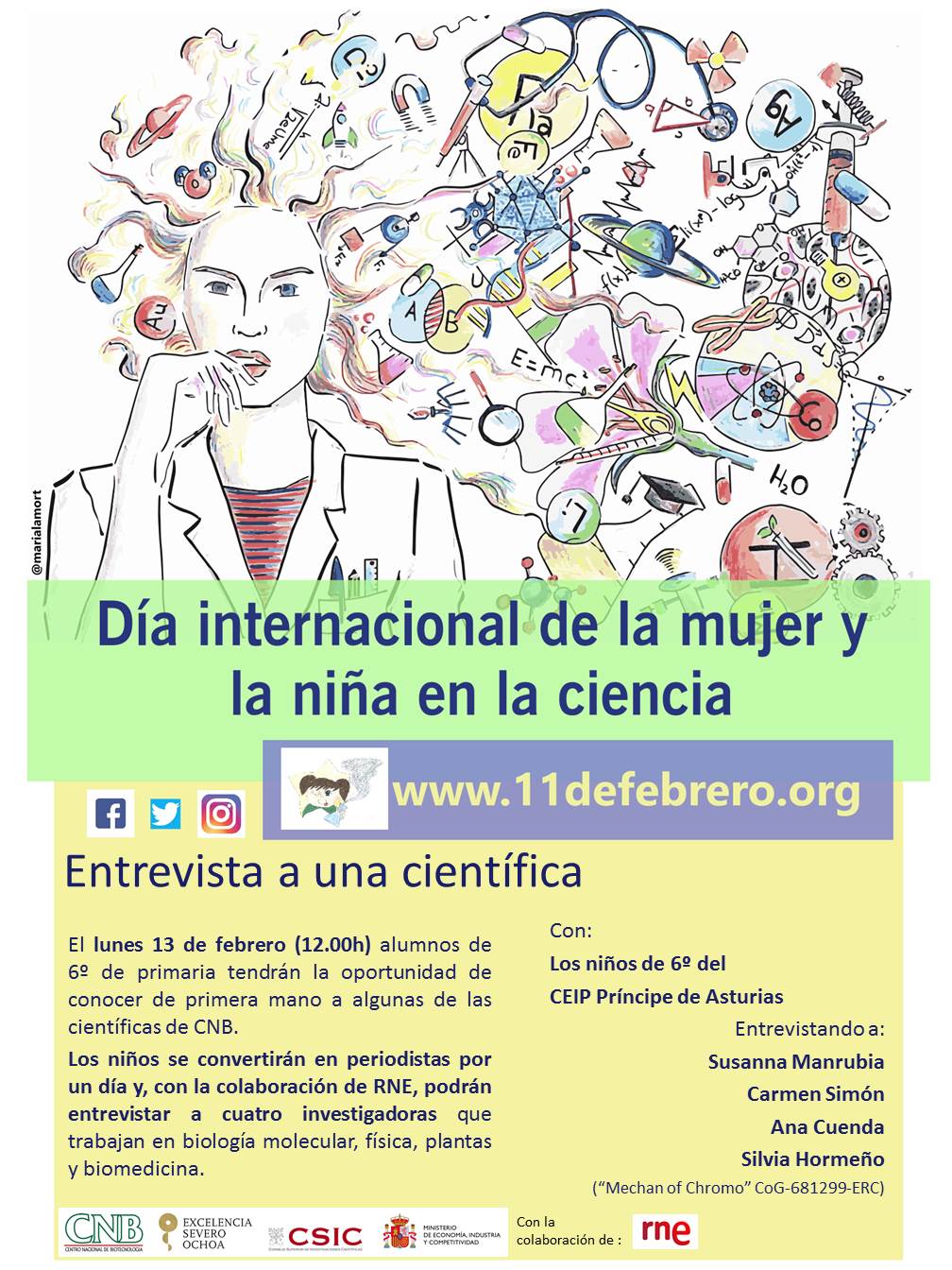
El pasado viernes día 30 de septiembre, los científicos del CNB-CSIC se unieron a las celebraciones europeas por la Noche de los Investigadores. El centro se convirtió por unas horas en un escenario hollywoodiense el que público de todas las edades pudo interaccionar con los investigadores para descubrir los secretos de la ciencia escondida detrás de superproducciones de ciencia-ficción como Blade Runner, Avatar o Marte.
COOKIES POLICY
A cookie is a text file that is stored on your computer or mobile device via a web server and only that server will be able to retrieve or read the contents of the cookie and allow the Web site remember browser preferences and navigate efficiently. Cookies make the interaction between the user and the website faster and easier.
General information
This Website uses cookies. Cookies are small text files generated by the web pages you visit, which contain the session data that can be useful later in the website. In this way this Web remembers information about your visit, which can facilitate your next visit and make the website more useful.
How do cookies?
Cookies can only store text, usually always anonymous and encrypted. No personal information is ever stored in a cookie, or can be associated with identified or identifiable person.
The data allow this website to keep your information between the pages, and also to discuss how to interact with the website. Cookies are safe because they can only store information that is put there by the browser, which is information the user entered in the browser or included in the page request. You can not run the code and can not be used to access your computer. If a website encrypts cookie data, only the website can read the information.
What types of cookies used?
The cookies used by this website can be distinguished by the following criteria:
1. Types of cookies as the entity that manages:
Depending on who the entity operating the computer or domain where cookies are sent and treat the data obtained, we can distinguish:
- Own cookies: are those that are sent to the user's terminal equipment from a computer or domain managed by the editor itself and from which provides the service requested by the user.
- Third party cookies: these are those that are sent to the user's terminal equipment from a machine or domain that is not managed by the publisher, but by another entity data is obtained through cookies.
In the event that the cookies are installed from a computer or domain managed by the editor itself but the information collected by these is managed by a third party can not be considered as party cookies.
2. Types of cookies as the length of time that remain active:
Depending on the length of time that remain active in the terminal equipment can be distinguished:
- Session cookies: cookies are a type designed to collect and store data while the user accesses a web page. Are usually used to store information that only worth preserving for the service requested by the user at any one time (eg a list of products purchased).
- Persistent cookies: cookies are a type of data which are stored in the terminal and can be accessed and treated for a period defined by the head of the cookie, and can range from a few minutes to several years.
3. Cookies types according to their purpose:
Depending on the purpose for which the data are processed through cookies, we can distinguish between:
- Technical cookies: these are those that allow the user to navigate through a web page or application platform and the use of different options or services it exist as, for example, control traffic and data communication, identify the session, access to restricted access parts, remember the elements of an order, make the buying process an order, make an application for registration or participation in an event, use security features while browsing store content for dissemination videos or sound or share content via social networks.
- Customization cookies: these are those that allow the user to access the service with some general characteristics based on a predefined set of criteria in the user terminal would eg language, the type of browser through which you access the service, the locale from which you access the service, etc.
- Analysis cookies: they are those that allow the responsible for them, monitoring and analyzing the behavior of users of the web sites that are linked. The information gathered through such cookies are used in measuring the activity of web sites, application or platform and for the profiling of user navigation of such sites, applications and platforms, in order to make improvements function data analysis how users use the service.
Management tool cookies
This Website uses Google Analytics.
Google Analytics is a free tool from Google that primarily allows website owners know how users interact with your website. Also, enable cookies in the domain of the site in which you are and uses a set of cookies called "__utma" and "__utmz" to collect information anonymously and reporting of website trends without identifying individual users..
For statistics of use of this website use cookies in order to know the level of recurrence of our visitors and more interesting content. This way we can concentrate our efforts on improving the most visited areas and make the user more easily find what they are looking for. On this site you can use the information from your visit for statistical evaluations and calculations anonymous data and to ensure the continuity of service or to make improvements to their websites. For more details, see the link below privacy policy [http://www.google.com/intl/en/policies/privacy/]
How to manage cookies on your computer: disabling and deleting cookies
All Internet browsers allow you to limit the behavior of a cookie or disable cookies within settings or browser settings. The steps for doing so are different for each browser, you can find instructions in the help menu of your browser.
If you decline the use of cookies, since it is possible thanks to the preferences menu of your browser or settings, reject, this website will continue to function properly without the use of the same.
Can you allow, block or delete cookies installed on your computer by setting your browser options installed on your computer:
- For more information about Internet Explorer click here.
- For more information on Chrome click here.
- For more information about Safari click here.
- For more information about Firefox click here.
Through your browser, you can also view the cookies that are on your computer, and delete them as you see fit. Cookies are text files, you can open and read the contents. The data within them is almost always encrypted with a numeric key corresponding to an Internet session so often has no meaning beyond the website who wrote it.
Informed consent
The use of this website on the other hand, implies that you paid your specific consent to the use of cookies, on the terms and conditions provided in this Cookies Policy, without prejudice to the measures of deactivation and removal of cookies that you can take, and mentioned in the previous section.

